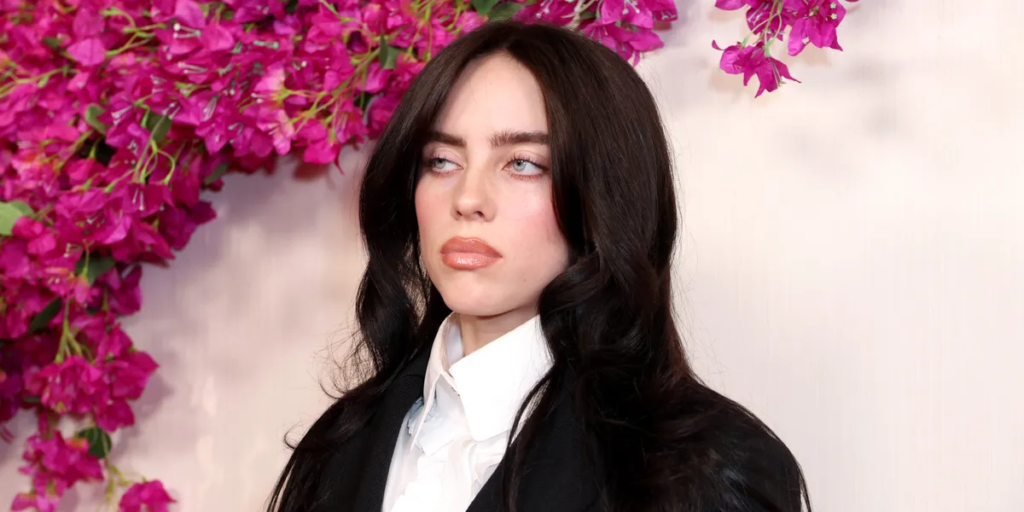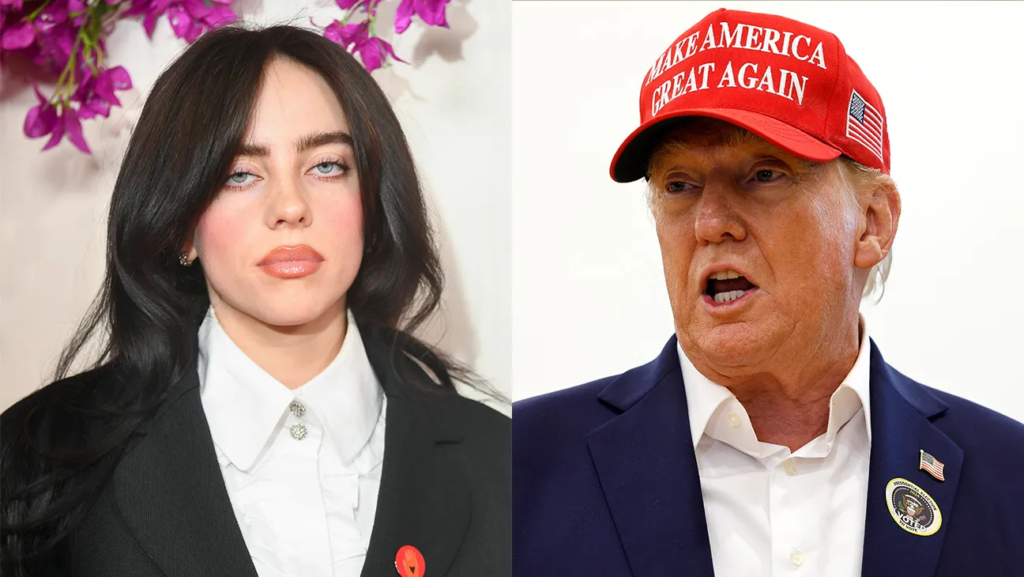In a heart-wrenching moment on stage, singer Billie Eilish spoke openly about her disappointment following Donald Trump’s recent presidential victory over Kamala Harris. Known for her advocacy on social justice and her vocal opposition to Trump, Eilish did not mince words in her criticism of the president-elect.
Performing in Nashville shortly after the election results were announced, she paused her concert to address the crowd, almost breaking down in tears as she shared her personal concerns and fears over Trump’s return to office.
Describing him as a “convicted predator” and someone “who hates women deeply,” she spoke passionately about what his presidency might mean for women’s rights, safety, and respect in America.
The Impact of Trump’s Presidency on Women’s Rights: Billie Eilish’s Concerns
Donald Trump’s election win marked a sobering moment for Eilish, who has long spoken out on issues like reproductive rights, gender equality, and abuse prevention. During her Nashville concert, she took a pause to address the women in her audience directly, creating a space of comfort and solidarity.
Billie Eilish’s words struck a chord with many, especially given Trump’s contentious history with women’s issues. Eilish dedicated her song “TV” to all the women in the crowd, highlighting the struggles and traumas many of them may have faced. The song, which refers to the recent overturning of Roe v. Wade, resonates strongly with those who see Trump’s presidency as a potential threat to women’s rights in the United States.
Eilish’s personal experience with abuse has heavily influenced her views. She has been open about her past traumas and how these experiences shaped her perspective on issues of consent, boundaries, and respect for women.
Read : Farhad Shakeri: Iranian Man Charged in Plot to Kill Donald Trump
By using her concert as a platform, Billie Eilish not only communicated her dismay but also offered support to her fans, reminding them that they were “safe” in her presence. Her emotional dedication of “TV,” a song that references the vulnerability of women’s rights, was a way of amplifying the voices of those who feel voiceless under the current political landscape.
Read : Trump Challenges Biden to Golf Match with $1 Million Charity Bet
In an era when reproductive rights and protections are being debated and, in some states, rescinded, Eilish’s dedication to her female fans took on a deeply personal and political significance.
Addressing Trump’s History of Misconduct
In her address to the Nashville crowd, Eilish referred to Donald Trump as a “convicted predator,” a comment that brought attention to his well-documented history with sexual misconduct allegations. Just last year, in a civil case, Trump was found liable for sexual abuse in a suit brought by author E. Jean Carroll.
Although this was a civil trial, and therefore not a criminal conviction, Trump was ordered to pay Carroll $5 million in damages. This case, along with accusations from more than two dozen other women, has contributed to a public image of Trump that many, including Eilish, view as harmful to women.
For Eilish and others, Trump’s return to the White House represents a troubling step backward for women’s rights. The singer’s pointed reference to Trump’s history was a stark reminder of the impact that leadership can have on societal attitudes towards women and survivors of abuse.

Eilish’s words in Nashville were not just about Trump but about a broader societal issue. Her concert speech pointed to what she sees as an underlying culture of dismissiveness toward women’s issues in politics, emphasizing the need for accountability, protection, and respect for women at all levels of society.
Eilish’s platform as a pop culture icon allows her to reach millions, and her courage to address these issues at her concert underscores her commitment to advocacy and change.
A Personal Stand Against Gender-Based Injustice
Billie Eilish’s activism did not start with her critique of Trump. Throughout her career, she has used her platform to speak out against issues of abuse and injustice, especially those related to gender. Her music and public speeches often reflect her personal experiences and the pain she has observed in others, particularly women who have endured abuse.
Billie Eilish’s emotional callout of Trump at her Nashville show was deeply personal, as she shared her own encounters with abuse and the impact these experiences had on her political views. Eilish’s words offered a sense of validation to the countless women who have felt marginalized or disregarded by society, especially under leadership figures accused of misogyny.
The young singer’s vocal opposition to Trump’s return to office is part of a larger trend among high-profile artists and public figures who are challenging societal norms around gender and justice. In choosing to call out Trump as “someone who hates women deeply,” Eilish was echoing the sentiments of many who see Trump’s presidency as a regression in the fight for gender equality.

Billie Eilish’s comments reflect a deep-seated concern over the cultural and social implications of electing a leader who has been publicly accused of disrespecting and mistreating women. By standing up for what she believes in, Eilish is using her platform to amplify the voices of those who have been hurt by similar figures and circumstances.
A Call for Unity and Resilience
Beyond her criticism, Eilish’s speech was a call for resilience among women. She encouraged her audience to remain united, to support one another, and to continue advocating for change. Her message went beyond a critique of Trump; it was a broader call to action for those who feel vulnerable in today’s political climate.
Billie Eilish urged her fans to keep fighting for justice, for dignity, and for the respect they deserve. Eilish’s passion for these issues and her willingness to speak out reflect her commitment to being a voice for those who often feel unheard or undervalued.
Eilish’s stand in Nashville was a reminder of the power that artists have to influence societal change. Her words brought attention to the ongoing struggles many women face, especially under political systems that, in her view, do not prioritize their rights. For her, Trump’s presidency is a painful reminder of these issues, but also a motivation to push for change.
Her message resonated deeply with her audience, as she reminded them that they are not alone in their struggles and that they have allies in the fight for justice.
The Role of Art and Activism in Social Change
As Eilish’s response demonstrates, artists and entertainers often play a pivotal role in shaping public opinion and inspiring social change. Eilish is among a growing number of artists who are using their influence to draw attention to pressing social issues and encourage activism among their fans.
Billie Eilish’s decision to openly condemn Trump’s return to office, despite the potential backlash, shows her dedication to her beliefs and to her audience.
Her Nashville performance was more than just a concert—it was a platform for advocacy, a rallying cry for those who feel threatened by the current political climate.

By addressing issues of abuse, women’s rights, and respect, Eilish is reminding the public of the power of unity and the importance of standing up for what is right. Her words reflect a generational shift towards greater awareness, empathy, and activism, as more young people seek to create a world where everyone is treated with respect and dignity.
Eilish’s poignant words in Nashville encapsulate a moment of reflection and resilience, one that resonates with her fans and with those who feel affected by similar issues.
Billie Eilish’s criticism of Trump is not just about one man—it’s about a system that she believes needs to change, one that values justice and equality for all. Through her platform, Eilish continues to inspire her audience to remain vigilant, to support one another, and to stand up for their rights, even in the face of daunting challenges.

